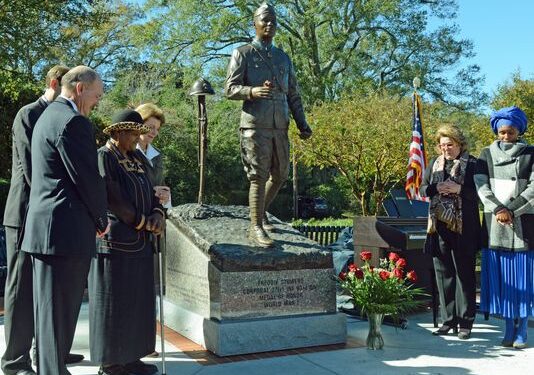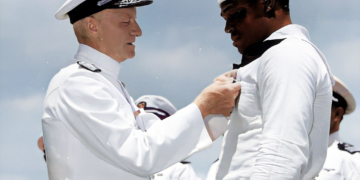March 27, 2025 Story by: Editor
The Defense Department has reinstated a webpage recognizing South Carolina war hero Freddie Stowers after it was previously removed as part of an effort to eliminate content highlighting the contributions of women and minority groups.
Cpl. Stowers, who lost his life in battle, was the first Black American awarded the Medal of Honor for “extraordinary heroism” during World War I.
His removal mirrored that of baseball legend Jackie Robinson and countless others who disappeared from the Defense Department’s website, a move linked to the Trump administration’s staunch opposition to diversity, equity, and inclusion (DEI) initiatives.
Among the erased content were tributes to the Tuskegee Airmen, the Navajo Code Talkers, and a Native American Marine involved in raising the flag at Iwo Jima. Even photos of the Enola Gay, the aircraft that dropped the atomic bomb on Hiroshima, were flagged for removal, seemingly due to the word “gay” in its name.
Following public backlash, some of these pages are being reinstated, but many may be lost permanently.
Last week, the webpage featuring Stowers, titled “Intrepid African American Soldiers Broke Barriers, Paved the Way,” displayed a “404 Page Not Found” error, with the letters “dei” added to the URL. Though restored, the updated page now contains only a brief mention of Stowers.
The Medal of Honor, the highest U.S. military recognition for valor, was celebrated on National Medal of Honor Day this Tuesday, observed annually on March 25 aboard the USS Yorktown in Charleston Harbor, home to the Congressional Medal of Honor Society.
A Hometown Hero
For South Carolinians, the erasure of Freddie Stowers struck a personal chord.
Born in Anderson County, where I have lived most of my life, Stowers died in battle at the age of 22 in 1918. A statue honoring him stands at Anderson University, just a short drive from my home, while the Anderson County Museum features a heartfelt tribute to his sacrifice.
Stowers’ removal from the Department of Defense website marked a second erasure, both tied to his race.
Initially recommended for the Medal of Honor in 1918, his recognition was delayed for 73 years, until President George H.W. Bush finally awarded him the honor in 1991.
Many historians, along with his great-niece, believe Stowers’ heroism—and that of numerous Black American soldiers—was overlooked due to racial segregation in the U.S. Army.
‘Extraordinary Heroism’
A grandson of enslaved people, Stowers grew up in a hardworking farming family in Sandy Springs, South Carolina.
Drafted at 21 years old in October 1917, he served as a squad leader in an all-Black regiment during World War I.
His Medal of Honor citation, read during a White House ceremony honoring his surviving sisters Georgina and Mary, eloquently details his courage:
“The president of the United States of America, in the name of Congress, takes pride in presenting the Medal of Honor (posthumously) to Cpl. Freddie Stowers, United States Army, for exceptional heroism on Sept. 28, 1918, while serving as a squad leader in Company C, 371st Infantry Regiment, 93d Infantry Division. Cpl. Stowers’ company was the lead company during the attack on Hill 188, Champagne Marne Sector, France, during World War I.
“A few minutes after the attack began, the enemy ceased firing and began climbing up onto the parapets of the trenches, holding up their arms as if wishing to surrender. The enemy’s actions caused the American forces to cease-fire and to come out into the open.
“As the company started forward and when within about 100 meters of the trench line, the enemy jumped back into their trenches and greeted Cpl. Stowers’ company with interlocking bands of machine gun fire and mortar fire causing well over 50% casualties.
“Faced with incredible enemy resistance, Cpl. Stowers took charge, setting such a courageous example of personal bravery and leadership that he inspired his men to follow him in the attack. With extraordinary heroism and complete disregard of personal danger under devastating fire, he crawled forward leading his squad toward an enemy machine gun nest, which was causing heavy casualties to his company.
“After fierce fighting, the machine gun position was destroyed, and the enemy soldiers were killed. Displaying great courage and intrepidity, Cpl. Stowers continued to press the attack against a determined enemy. While crawling forward and urging his men to continue the attack on a second trench line, he was gravely wounded by machine gun fire.
“Although Cpl. Stowers was mortally wounded, he pressed forward, urging on the members of his squad, until he died. Inspired by the heroism and display of bravery of Cpl. Stowers, his company continued the attack against incredible odds, contributing to the capture of Hill 188 and causing heavy enemy casualties.
“Cpl. Stowers’ conspicuous gallantry, extraordinary heroism, and supreme devotion to his men were well above and beyond the call of duty, follow the finest traditions of military service, and reflect the utmost credit on him and the United States Army.”
A Legacy Worth Preserving
Stowers was the first of only two Black Americans awarded the Medal of Honor for heroism in World War I.
Lt. Col. Taylor Voorhis Beattie, writing for Military History magazine, compared Stowers to famed World War I hero Sgt. Alvin York, who was immortalized in the classic 1941 film starring Gary Cooper.
Both York and Stowers came from humble Southern farm backgrounds, had limited access to education and economic opportunities, and were drafted into the U.S. Army, where they displayed extraordinary valor under fire.
The life and sacrifice of Freddie Stowers are integral to both South Carolina’s and America’s history. His story deserves to be honored, not erased.
As a Pentagon spokesperson acknowledged on Friday, referring to the content purge as a mistake:“ History is not DEI.”
Source: South Carolina Daily Gazette

















